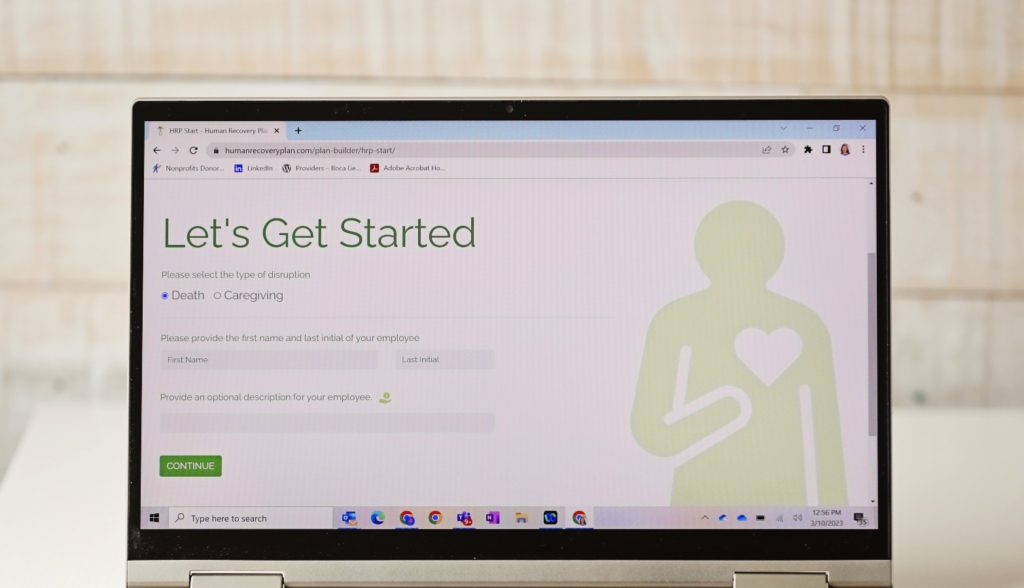
6 Mistakes Leaders Make with Bereaved Employees
Build trust and preserve employee engagement, retention and productivity by strengthening your empathy muscle. Our platform can help.
Without a balance of head and heart-based empathy skills education, leaders risk making six common—often innocent—mistakes when it comes to responding to a grieving employee. These pitfalls can be costly, unraveling trust, fueling disengagement and turnover, and harming employee performance.
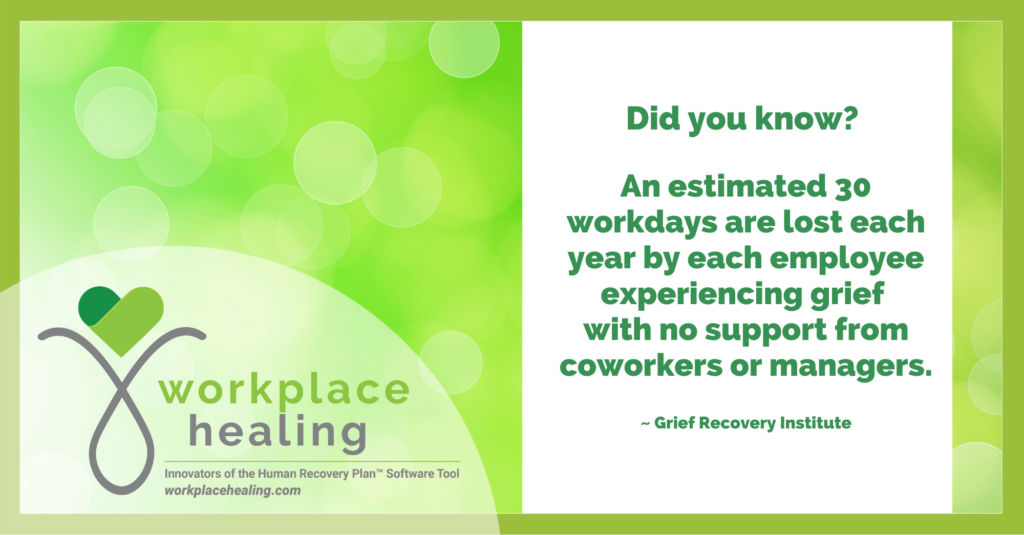
1 – Isolating silence.
Addressing someone who is grieving can feel awkward if you’re worried about saying the wrong thing. The last thing anyone wants to do is cause additional pain. But pretending that nothing is wrong is worse, often contributing to even more hurt and a sense of isolation for an employee experiencing a life disruption.
As one employee put it:
“After my father died by suicide, I returned to work after five days of bereavement. On my first day back at work, no one in my workplace except the president of the company acknowledged my tragic loss. It was devastating.”
A better way to address a grieving employee would be to say, “I don’t know how you feel, but I’m here to help in any way I can.”
2 – Confusing generalizations.
When Jerra Mitchell’s father died, her manager told her to “take all of the time that you need.” Those simple words commonly trotted out by management sound nice, but they can lead to ambiguity and confusion for the employee and make it more complicated to successfully reintegrate an employee back to work, further exacerbating an already stressful situation.
Jerra took her manager at his word. Unable to take extended bereavement leave or access FMLA because she was just shy of the minimum year of employment required, she took two and a half weeks of leave by cobbling together all of her vacation and sick time and taking a week of unpaid time off.
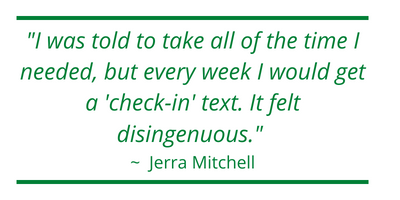 “I was told to take all of the time I needed, but every week I would get a ‘check-in’ text. It felt disingenuous,” says Jerra, who is now a Business Development Representative for Workplace Healing. “While trying to process grief, there were already enough calls and texts from family. My manager’s behavior only made things worse because I felt obligated to respond on top of my other obligations.”
“I was told to take all of the time I needed, but every week I would get a ‘check-in’ text. It felt disingenuous,” says Jerra, who is now a Business Development Representative for Workplace Healing. “While trying to process grief, there were already enough calls and texts from family. My manager’s behavior only made things worse because I felt obligated to respond on top of my other obligations.”
Understand your company’s bereavement leave policies and your employee’s personal situation to ensure you’re both on the same page. This will help you plan for their absence with the rest of your team while also preserving the time and space your employee needs to privately grieve with loved ones.
3 – Insensitive comments.
Sharing “silver linings” or how you can relate to a griever’s loss isn’t usually helpful and often feels dismissive.
“I have this whole list of things grievers have shared that someone said to them that may have been meant well but were incredibly unhelpful or even detrimental,” says Sharon Davis, a licensed professional counselor who specializes in grief recovery. “One of the worst I’ve ever heard involved a woman who had lost a baby to miscarriage. Someone at her place of employment said, ‘oh well, I guess the good news is you won’t have to go through all that potty training.'”
 As a rule, avoid any statements that begin with the words “at least.”
As a rule, avoid any statements that begin with the words “at least.”
Even if you aren’t sure what to say to acknowledge a bereaved employee’s pain, take time to listen. “Your employees want to be heard. They want to know that even if you don’t understand—and you don’t—that you care,” Sharon says.
Learn the top 10 best things to say to someone who is grieving.
4 – Not doing or saying enough.
Successfully re-integrating a grieving employee into the workplace requires more than, “I’m sorry for your loss.” Grief recovery in the workplace is an ongoing process that requires a head and heart-based strategy encompassing practical thinking, thoughtful awareness and sensitivity.
Ask questions to help you best determine your employee’s needs when they return from bereavement leave. For example:
- “What is your capacity today?”
- “Would it be helpful if I found someone else to manage this assignment for you right now?”
- “How can I best support you?”
Allison Doss, who experienced PTSD following the devastating loss of her teenage daughter to suicide, was extra sensitive to loud noises and movements. The open office environment where she worked, surrounded by rows of desks and the hustle and bustle of coworkers, triggered her trauma. Fortunately, her supervisor was attentive to her needs and accommodated her request to work from home and use a quiet conference room when she was in the office.
Read more about what to do and say when an employee experiences the loss of a loved one by suicide: 8 Ways Business Leaders Can Support an Employee Grieving a Suicide.
5 – Lack of understanding.
Just because your employee is back at work doesn’t mean their grief has come to an end or that it will stay parked outside of the building. “The old concept used to be my work life was here, my personal life was here,” Sharon says. “In reality, that’s not how it works. It’s all mushed up in there together.”
Like many grievers, Jerra says she often struggled with brain fog when she returned to work after her father died. Her struggles to re-engage with work at her previous level of productivity often frustrated her employer.
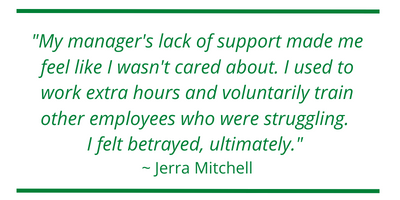 “My manager’s lack of support made me feel like I wasn’t cared about. I used to work extra hours and voluntarily train other employees who were struggling. At the very least, I thought they would’ve taken all of this into consideration when I needed more time off. I felt betrayed, ultimately,” Jerra says.
“My manager’s lack of support made me feel like I wasn’t cared about. I used to work extra hours and voluntarily train other employees who were struggling. At the very least, I thought they would’ve taken all of this into consideration when I needed more time off. I felt betrayed, ultimately,” Jerra says.
A supervisor can help support an employee suffering from the symptoms of grief by temporarily reassigning tasks to other willing team members and by encouraging time for self-care. For example, if you notice your employee isn’t eating or taking time for lunch, arrange to have a healthy lunch delivered to the office or take them to lunch for conversation and a break.
Learn more about how grief affects the brain and ways you can create a more empathetic workplace that supports human recovery.
6 – Too emotionally invested.
While empathy is a valuable leadership skill, beware of becoming so emotionally attached to your employee’s situation that you lose your objectivity to the detriment of your team and your organization.
Liz Barnard, Human Resources Director for the City of Shawnee, says that it’s important for leaders to set boundaries, even when it’s difficult. She recalls Shawnee Fire Department Chief Jeff Hudson’s exceptional leadership in the aftermath of the tragic death of John B. Glaser, a firefighter who died while fighting a house fire in 2010.
“Our firefighters wanted to rush in and try to find and save him. He was their brother, but that would have been a disaster,” Liz says. Recognizing that his firefighters were too emotionally invested to follow normal protocols, Hudson ordered them to stand down, bringing in a team from outside the department to take over during the search for Firefighter Glaser.
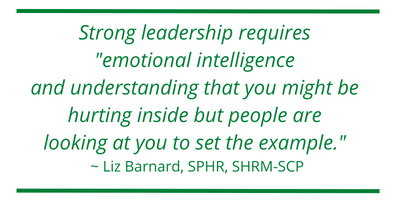 “Jeff (who retired in 2011) did an amazing job and was quick to get the critical incident debrief professionals and counselors on site and calling in every single member of our department because he wanted to make the announcement to the entire group (before it made news),” Liz says, “He stood up and was a leader. I think that’s what it takes—having emotional intelligence and being smart enough to understand that you might be hurting inside, but people are looking at you to set the example.”
“Jeff (who retired in 2011) did an amazing job and was quick to get the critical incident debrief professionals and counselors on site and calling in every single member of our department because he wanted to make the announcement to the entire group (before it made news),” Liz says, “He stood up and was a leader. I think that’s what it takes—having emotional intelligence and being smart enough to understand that you might be hurting inside, but people are looking at you to set the example.”
Effective leadership begins here.
Workplace Healing’s Human Recovery Platform™ provides 24/7 empathy skills education for leaders. Within minutes, the easy-to-use software helps you select a balance of head and heart-based tactics to ensure you know exactly what to say and what to do to best support your grieving or caregiving-affected employee. The Human Recovery Platform™:
- Complements your organization’s EAP and maximizes your ESG.
- Creates a leadership roadmap to address grief internally.
- Enhances your communication and empathy skills.
- Eliminates the guesswork about what to do and say to support an employee suffering from a life disruption
To learn how you and your leadership team can strengthen your empathy skills, contact us for a demo of the Human Recovery Platform™.
